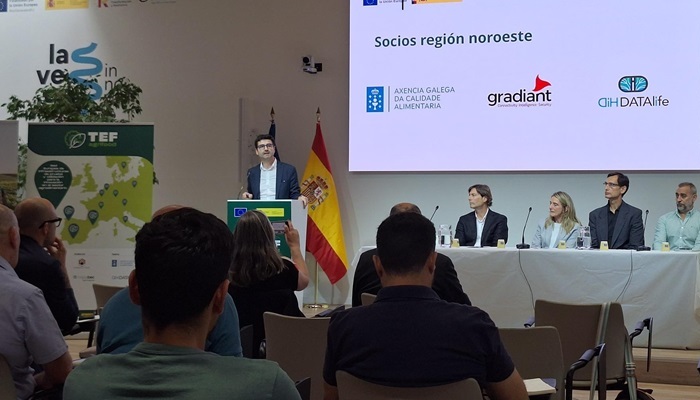Gradiant Presents the Spanish Satellite of AgrifoodTEF Focused on AI and Robotics for the Agrifood Sector

The Galician node of AgrifoodTEF Spain has funding of over one and a half million euros within the Project
The Ministry of Agriculture, Fisheries, and Food (MAPA) co-finances the Spanish satellite of AgrifoodTEF with 2.5 million euros alongside the European Commission, which contributes another 2.5 million euros
Gradiant participated yesterday in the presentation of the Spanish satellite of AgrifoodTEF, the largest project in Europe focused on Artificial Intelligence and Robotics within the agrifood sector. The event centered on innovation and technology and was held at the facilities of La Vega Innova, the innovation hub of the Ministry of Agriculture, Fisheries, and Food (MAPA) of Spain in Madrid. This event was coordinated by the AgrifoodTEF Spain consortium partners: the University of Lleida, Gradiant, the Galician Agency for Food Quality (AGACAL), the University of Córdoba, and the affiliated entities Hispatec, CEP – Centre d’Estudis Porcins, Agrotecnio, Parc Agrobiotech Lleida, and DATAlife.
What is AgrifoodTEF?
AgrifoodTEF, short for Testing and Experimentation Facilities, is a network of testing and validation infrastructures in real environments, both physical and virtual, designed for the development of technologies, products, or services, especially in innovative areas such as artificial intelligence and robotics. This ambitious project has a total budget of 60 million euros in Europe and 5 million euros in Spain (2.5 million euros from the European Commission and another 2.5 from the Spanish Ministry of Agriculture, Fisheries, and Food) and has a duration of 5 years, from 2023 to 2027. The initiative consists of 2 nodes (Italy and France) and 6 satellites (Austria, Belgium, Spain, Netherlands, Poland, and Sweden) that bring together more than 30 collaborating entities. Additionally, it has been made possible thanks to the co-financing of the European Union’s Digital Europe Program and the Directorate General for Rural Development, Innovation, and Agri-Food Training of the Ministry of Agriculture, Fisheries, and Food.
The event began with the official inauguration by Isabel Bombal, Director General of Rural Development, Innovation, and Agri-Food Training of the Ministry of Agriculture, Fisheries, and Food of Spain, who highlighted the importance of such initiatives for the Spanish agrifood sector and the fundamental role of the Ministry in this and other projects that “will drive its transformation and growth.
Experience and Infrastructures
Raffaele Giaffreda, the European coordinator of the project, presented the project globally. Representing the UCO, Rosa Gallardo Cobos explained part of the Spanish satellite initiative of the AgrifoodTEF project. Our colleague Marcos Álvarez, Head of Public Research and Innovation Policies, presented the various partners of the Galician node in the project and shared our organization’s experience in the field of digitization of the agrifood sector for nearly a decade in national and European initiatives. He also explained the technologies our organization can provide to companies that join the project. The infrastructures and services of the Spanish satellite were also highlighted, with interventions from Lluis Miguel Pla, professor at the University of Lleida; Manuel López Luaces, Head of the Training, Innovation, and Agricultural Research Area of the Galician Agency for Food Quality (AGACAL); and Javier Mesas and Francisco Márquez, professors at the University of Córdoba.
AI for the Dairy Sheep Sector
Following this, other Artificial Intelligence projects applied to the agrifood sector were presented. Our colleague Joaquín Lago, who works on the GC4SHEEP project, an AI project applied to artificial insemination for the improvement of dairy sheep, explained the latest advances in this initiative by the supra-autonomous Operational Group. Other projects were also presented: “La Vega Innova,” by Maite Ambrós, Deputy Director General of Innovation and Digitization – Directorate General for Rural Development, Innovation, and Agri-Food Training of the Ministry of Agriculture, Fisheries, and Food of Spain, and Juan Marcelo Gaitán of Telefónica; “AI for Estimation of Grape Harvest for Winemaking,” by Pablo Franco, from the Qualified Designation of Origin La Rioja; AgrarIA Mission: “Artificial Intelligence Applied to the Value Chain of Agricultural Production 2050,” by Eric Polvorosa, Marketing and Communication Department at GMV Secure e-Solutions; “Integration of Marker-Assisted Immunocompetence Selection in Dairy and Beef Cattle Selection Programs,” by the supra-autonomous Operational Group INMUNOGEN, by Marta Alonso Fernández-Pacheco of NEIKER; and “Use of New Technologies for the Correct Estimation of Citrus Yield,” by the supra-autonomous Operational Group CITRIAFORO, by Nicolás Juste Vidal of ANECOOP.
Networking at La Vega Innova
To conclude the morning, an Expert Panel moderated by Maite Ambrós, Deputy Director General of Innovation and Digitization of the Ministry, discussed the potential of AgrifoodTEF and other AI projects to respond to the acceleration needs of the Spanish agrifood sector. The panel featured Lucía Castro, manager of DATAlife, representing the Galician node of AgrifoodTEF Spain; Adolfo Peña, representing the Cordoba node of AgrifoodTEF Spain; Jorge Blanco, Director of R&D&I at Greenfield Technologies, Impact Innovation Manager at xFarm; Zheni Valerieva, Sales Manager at Hyperplan.
The event concluded in the afternoon with a workshop in small groups where participating companies worked with AgrifoodTEF specialists to explore how the project can accelerate the development of their products and services.
Additionally, it was broadcast live on the La Vega Innova YouTube channel, allowing a broader audience to follow the presentations and discussions in real-time.

This project has received co-funding from the European Union’s Digital Europe Program under agreement No. 101100622.
The views and opinions expressed are solely those of the author(s) and do not necessarily reflect those of the European Union, the European Commission, or the Ministry of Agriculture, Fisheries, and Food. Neither the European Union, the European Commission, nor the MAPA are responsible for them.
